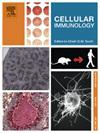Zinc finger protein 217 contributes to natural killer cell dysfunction in murine colorectal cancer
IF 2.9
4区 医学
Q2 CELL BIOLOGY
引用次数: 0
Abstract
Immune cells play active roles in the surveillance and control of colorectal cancer (CRC) progression. Natural killer (NK) cells are powerful anti-tumor effector cells but their regulatory mechanisms in the CRC tissues have not been thoroughly elucidated. In this research using a murine inflammatory colorectal cancer model, we characterized the phenotype and function of NK cells. We found signs of NK cell dysfunction in CRC tissues, including up-regulation of exhaustion markers, down-regulation of activating receptors, deficiencies in degranulation and cytokine expression, and weak cytolytic effect. Interestingly, zinc finger protein 217 (ZNF217), a transcription repressor, was significantly up-regulated in CRC-associated NK cells. In vitro assays revealed that ZNF217 knockdown promoted NK cell cytolytic activity, implying that ZNF217 is an inhibitory factor of NK cell function. Adoptive transfer assays indicated that ZNF217 knockdown also resulted in enhancement of NK cell function in vivo and subsequently suppressed CRC development. Furthermore, hypoxia rather than exhaustion up-regulated ZNF217 expression in NK cells. ZNF217 knockdown promoted NK cell resistance to hypoxia-mediated NK cell dysfunction. Therefore, we discovered a novel regulatory factor of NK cell dysfunction during CRC development.
锌指蛋白217与小鼠结直肠癌自然杀伤细胞功能障碍有关
免疫细胞在监测和控制结直肠癌(CRC)进展中发挥积极作用。自然杀伤细胞(NK)是一种强大的抗肿瘤效应细胞,但其在结直肠癌组织中的调控机制尚未完全阐明。在本研究中,我们利用小鼠炎性结直肠癌模型,表征NK细胞的表型和功能。我们在结直肠癌组织中发现NK细胞功能障碍的迹象,包括衰竭标志物上调,激活受体下调,脱颗粒和细胞因子表达不足,细胞溶解作用弱。有趣的是,锌指蛋白217 (ZNF217),一种转录抑制因子,在crc相关的NK细胞中显著上调。体外实验显示,ZNF217敲低可促进NK细胞的细胞溶解活性,提示ZNF217是NK细胞功能的抑制因子。过继转移实验表明,ZNF217敲低也导致体内NK细胞功能增强,随后抑制结直肠癌的发展。此外,缺氧而非衰竭上调了NK细胞中ZNF217的表达。ZNF217敲低可促进NK细胞对缺氧介导的NK细胞功能障碍的抵抗。因此,我们发现了在结直肠癌发展过程中NK细胞功能障碍的一个新的调节因子。
本文章由计算机程序翻译,如有差异,请以英文原文为准。
求助全文
约1分钟内获得全文
求助全文
来源期刊

Cellular immunology
生物-免疫学
CiteScore
8.20
自引率
2.30%
发文量
102
审稿时长
30 days
期刊介绍:
Cellular Immunology publishes original investigations concerned with the immunological activities of cells in experimental or clinical situations. The scope of the journal encompasses the broad area of in vitro and in vivo studies of cellular immune responses. Purely clinical descriptive studies are not considered.
Research Areas include:
• Antigen receptor sites
• Autoimmunity
• Delayed-type hypersensitivity or cellular immunity
• Immunologic deficiency states and their reconstitution
• Immunologic surveillance and tumor immunity
• Immunomodulation
• Immunotherapy
• Lymphokines and cytokines
• Nonantibody immunity
• Parasite immunology
• Resistance to intracellular microbial and viral infection
• Thymus and lymphocyte immunobiology
• Transplantation immunology
• Tumor immunity.
 求助内容:
求助内容: 应助结果提醒方式:
应助结果提醒方式:


